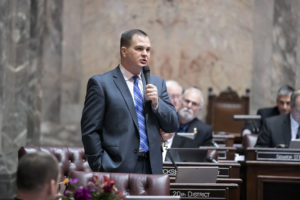OLYMPIA…Legislation introduced today would require all three branches of state government to track and submit data regarding sexual harassment of employees for detailed annual reports that would be public.
Sen. John Braun and Sen. Ann Rivers come at Senate Bill 5845 from different directions but are sponsoring it with the same goal: learning the extent of sexual-harassment claims made by state employees, and how those are addressed. If the bill becomes law, the initial report would look back three years to provide context for future tracking.
“It’s obvious that sexual harassment happens within state government – until yesterday, there was a vacant seat in the Senate for that reason. I know the Legislature has been stepping up its efforts to address workplace conduct, and maybe the other branches have also. But without better data, it’s going to be a challenge to tell whether any of this is having the desired effect,” said Rivers, R-La Center, who has been out front for Senate Republicans on the issue since the #MeToo movement emerged in late 2017.
For Braun, R-Centralia, the bill is his second try to get the requirement into law. The idea was part of budget legislation he proposed in 2018.
“My first concern is about the human cost of sexual harassment – this behavior is just plain wrong. We need to shine the brightest possible light within state government to make sure we are leading the way in eliminating sexual harassment from the workplace.
“But as sexual harassment is a management issue, it also can come with a financial cost. This bill would get at that by requiring the reporting of settlements or judgments as well as the claims themselves,” said Braun, who recently exposed more than $500 million worth of management missteps within the state’s executive branch.
“To paraphrase a saying, you can’t manage what you don’t measure. My hope is that tracking the data regarding sexual harassment will reveal any trends, and making the annual reports public will help improve policies and management where needed. For those of us who value the work our state employees do, this bill is a way to demonstrate it.”
The two lawmakers said their legislation is modeled after a proposal in California, requested by its governor after a series of newspaper reports revealed the state did not know the extent of sexual harassment claims or costs brought by state employees.









